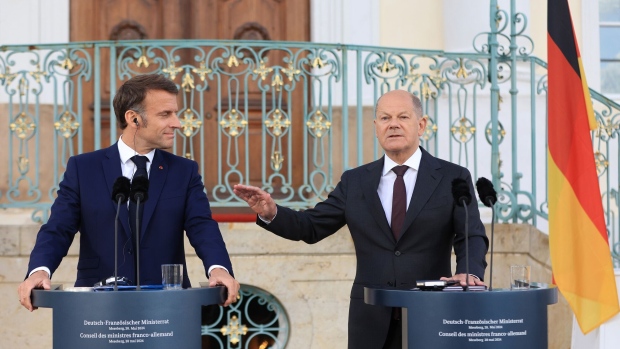Jun 27, 2024
Macron and Scholz’s Summit Hijack Hits a Wall of Angry EU Leaders
, Bloomberg News

(Bloomberg) -- France and Germany are used to getting their way on the EU stage. But when the bloc’s two biggest economies turned up at Thursday’s crucial European Union summit distracted by their own domestic troubles, they found it harder to throw their weight around.
Other member states reacted furiously when President Emmanuel Macron and Chancellor Olaf Scholz attempted to force through a last-minute rewrite of their long-term policy priorities, according to people inside the room who asked not to be named when discussing confidential negotiations. Almost all of France and Germany’s amendments were rejected.
It’s rare that a proposal by the two biggest member states draws such a strong reaction, according to one EU diplomat. But both their leaders arrived at the summit weakened by their crushing defeats in this month’s European elections.
The bust-up came during discussion of the EU’s so called strategic agenda, which lays out the principles for how the EU will respond to its biggest challenges, like immigration, climate and the war in Russia. Macron and Scholz demanded changes to the wording on sensitive subjects like defense.
But it was less the substance of the tweaks that angered fellow leaders as the last-minute manner in which they were demanded, according to numerous diplomats, given the document had already been strenuously negotiated by all sides earlier in the week. In the end, they agreed to only minor adjustments.
“There was no mood to break up the whole text,” Danish Prime Minister Mette Frederiksen said afterward. An official from Berlin said the pair were just trying to bring clarity to a difficult process.
Exhausted Ministers
The French president followed up his dire EU result by calling a parliamentary election at home. The idea was to revive his political fortunes with a rousing campaign, but polls suggest he’s heading for another crushing reversal that could hand power to Marine Le Pen’s far right.
The erratic behavior from the bloc’s two biggest powers is a worrying sign for EU leaders as they try to deal with a growing list of challenges, from Russia’s aggression in Ukraine, to trade tensions with the US and China and lackluster economic growth. Scholz hinted after the summit that he’d discussed the situation in France with Macron, without offering any details.
“Of course, everyone is talking about it,” Hungarian Prime Minister Viktor Orban said of the forthcoming French vote, as he arrived at Thursday’s summit.
French ministers looked exhausted during meetings in Brussels this week, according to one EU diplomat, staying for an hour and then rushing out to work on the campaign.
One diplomat said they were concerned about the effect that successive defeats for Macron would have at future summits, when he will almost certainly be further weakened. A person close to Macron’s team said that the mood among French officials was grim.
In a sign of his increasingly desperate efforts to lock things down before the French vote, Macron announced that he plans to reappoint his compatriot Thierry Breton to one of the EU’s most senior roles when he spoke to reporters after the meeting.
“He has the experience and the quality,” Macron said, as he attacked the “arrogance” of his opponents for drawing up plans for cabinet appointments before the French have cast their ballots.
If Le Pen’s National Rally wins an absolute majority in the parliamentary elections whose first round is on Sunday, the euroskeptic party would get to pick a prime minister and could weigh in on key European appointments. Breton, 69, currently holds the post of Internal Markets Commissioner.
--With assistance from Donato Paolo Mancini, Alberto Nardelli, Ania Nussbaum, Jorge Valero, Natalia Drozdiak, Andrea Palasciano, Olivia Fletcher, Sanne Wass, Kevin Whitelaw, Max Ramsay, Michael Nienaber and Milda Seputyte.
(Updates with details of negotiations in 4th and 5th paragraphs.)
©2024 Bloomberg L.P.







